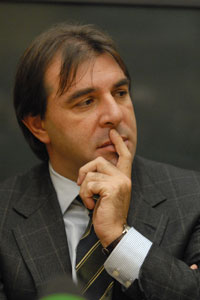 Switzerland Brahms, Ein deutsches Requiem: Martina Jankova (Soprano), Thomas Hampson (baritone), Orchestra of the Zurich Opera, Daniele Gatti (conductor), Camerata Vocale Freiburg, Tonhalle Zurich, 23.10.2011, (JR)
Switzerland Brahms, Ein deutsches Requiem: Martina Jankova (Soprano), Thomas Hampson (baritone), Orchestra of the Zurich Opera, Daniele Gatti (conductor), Camerata Vocale Freiburg, Tonhalle Zurich, 23.10.2011, (JR)

The patrician burghers of Zurich ventured out on a chilly, misty morning in their Sunday finery, not to church as is often their wont, but to hear Brahms’ humanist Requiem. It is really not a Requiem at all, but more an acceptance of life’s short span and a vague hope of an after-life. This concert, given in Zurich’s Tonhalle, was the first so-called “Philharmonic” concert given this season by the orchestra of the Zurich Opera (it will be followed, next year, by all Brahms’ symphonies); it was originally planned to have the Zurich Opera chorus sing the Requiem. That chorus had mastered Verdi’s Requiem with Gatti and the same orchestra last season. For undisclosed reasons, it was decided to change the chorus this time to the German Camerata Vocale Freiburg.
So was this Requiem going to be weighty, monumental, slow or was it to be crisp, modern, historically-correct and therefore brisk? Clocking in at 75 minutes, it was clearly more the former than the latter. Generally Gatti favoured slow speeds, always stressing the beauty of this music; occasionally however the performance was too languid – generally I missed a lack of buoyancy which comes with faster speeds. (George Bernard Shaw must have heard a slow account – he dismissed the work as that of an undertaker).
Thomas Hampson, a regular in Zurich for decades, tried not to look his usual dapper and debonair self for this serious piece; whilst his tone was creamy in middle and lower registers, his upper register now sounds a mite dry. He sang authoritatively without a score, having recorded the work recently under Nikolaus Harnoncourt. Martina Jankova’s sparkling top notes impressed in a radiant “Ihr habt nun Traurigkeit” (“And ye now therefore had sorrow”).
The orchestra accompanied sensitively at all times, only needing Gatti’s occasional suppression to ensure the chorus could be heard.
The Chorus is one of the more renowned German vocal chamber choirs, with several prizes under its belt, formed in 1977. Its core of 25 to 40 trained choristers was enlarged for this performance to some 70 to ensure there was no lack of volume or energy in a relatively large hall and with a large orchestra to combat. They were the undoubted stars of the show: their diction – as might be expected – was crisp, their tone was rich and dynamics were always well regarded. They were as impressive when they were hushed (as in the delicate opening “Selig sind, die da Leid tragen” – “Blessed are they that mourn”) as when they were singing fortissimo (as in the serious tread of “Denn alles Fleisch, es ist wie Gras”, “For all flesh is as grass”). They were radiant in “Wie lieblich sind Deine Wohnungen” (How lovely is thy dwelling-place) and their “Tod, wo ist dein Stachel?” (O death, where is thine sting?) packed a glorious punch. The final “Selig sind die Toten” (“Blessed are the dead who die in the Lord”) was celestial and left the audience basking in a warm Brahmsian glow. Emerging from the hall, autumn sunshine had indeed dispelled the morning’s mist.
John Rhodes